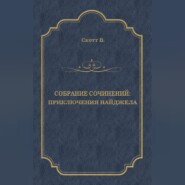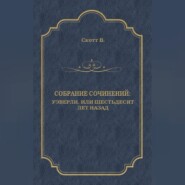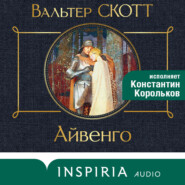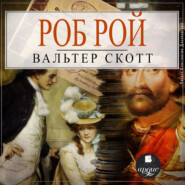По всем вопросам обращайтесь на: info@litportal.ru
(©) 2003-2024.
✖
The Fortunes of Nigel
Настройки чтения
Размер шрифта
Высота строк
Поля
For exercise of arms a bale of dice,
And two or three packs of cards to show the cheat
And nimbleness of hand; mistake a cloak
From my lord’s back, and pawn it; ease his pockets
Of a superfluous watch, or geld a jewel
Of an odd stone or so; twinge three or four buttons
From off my lady’s gown: These are the arts,
Or seven liberal deadly sciences,
Of pagery, or rather paganism,
As the tides run; to which, if he apply him,
He may, perhaps, take a degree at Tyburn,
A year the earlier come to read a lecture
Upon Aquinas, at Saint Thomas-a-Watering’s
And so go forth a laureate in hemp-circle.”
The New Inn, Act I.
Note X. p. 135. – LORD HENRY HOWARD
Lord Henry Howard was the second son of the poetical Earl of Surrey, and possessed considerable parts and learning. He wrote, in the year 1583, a book called, A Defensative against the Poison of supposed Prophecies. He gained the favour of Queen Elizabeth, by having, he says, directed his battery against a sect of prophets and pretended soothsayers, whom he accounted infesti regibus, as he expresses it. In the last years of the Queen, he became James’s most ardent partisan, and conducted with great pedantry, but much intrigue, the correspondence betwixt the Scottish King and the younger Cecil. Upon James’s accession, he was created Earl of Northampton, and Lord Privy Seal. According to De Beaumont the French Ambassador, Lord Henry Howard, was one of the greatest flatterers and calumniators that ever lived.
Note XI. p. 136. – SKIRMISHES IN THE PUBLIC STREETS
Edinburgh appears to have been one of the most disorderly towns in Europe, during the sixteenth and beginning of the seventeenth century. The Diary of the honest citizen Birrel, repeatedly records such incidents as the following: “The 24 of November (1567), at two afternoon, the Laird of Airth and the Laird of Weems met on the High Gate of Edinburgh, and they and their followers fought a very bloody skirmish, where there were many hurt on both sides with shot of pistol.” These skirmishes also took place in London itself. In Shadwell’s play of The Scowrers, an old rake thus boasts of his early exploits: – “I knew the Hectors, and before them the Muns, and the Tityretu’s; they were brave fellows indeed! In these days, a man could not go from the Rose Garden to the Piazza once, but he must venture his life twice, my dear Sir Willie.” But it appears that the affrays, which, in the Scottish capital, arose out of hereditary quarrels and ancient feuds, were in London the growth of the licentiousness and arrogance of young debauchees.
Note XII. p. 144. – FRENCH COOKERY
The exertion of French ingenuity mentioned in the text is noticed by some authorities of the period; the siege of Leith was also distinguished by the protracted obstinacy of the besieged, in which was displayed all that the age possessed of defensive war, so that Brantome records that those who witnessed this siege, had, from that very circumstance, a degree of consequence yielded to their persons and opinions. He tells a story of Strozzi himself, from which it appears that his jests lay a good deal in the line of the cuisine. He caused a mule to be stolen from one Brusquet, on whom he wished to play a trick, and served up the flesh of that unclean animal so well disguised, that it passed with Brusquet for venison.
Note XIII. p. 145. – CUCKOO’S NEST
The quarrel in this chapter between the pretended captain and the citizen of London, is taken from a burlesque poem called The Counter Scuffle, that is, the Scuffle in the Prison at Wood street, so called. It is a piece of low humour, which had at the time very considerable vogue. The prisoners, it seems, had fallen into a dispute amongst themselves “which calling was of most repute,” and a lawyer put in his claim to be most highly considered. The man of war repelled his pretence with much arrogance.
“‘Wer’t not for us, thou swad,’ quoth he,
‘Where wouldst thou fay to get a fee?
But to defend such things as thee
‘Tis pity;
For such as you esteem us least,
Who ever have been ready prest
To guard you and your cuckoo’s nest,
The City’”
The offence is no sooner given than it is caught up by a gallant citizen, a goldsmith, named Ellis.
“‘Of London city I am free,
And there I first my wife did see,
And for that very cause,’ said he,
‘I love it.
And he that calls it cuckoo’s nest,
Except he say he speaks in jest,
He is a villain and a beast, —
‘I’ll prove it!
For though I am a man of trade,
And free of London city made,
Yet can I use gun, bill, and blade,
In battle.
And citizens, if need require,
Themselves can force the foe retire,
Whatever this low country squire
May prattle.’”
The dispute terminates in the scuffle, which is the subject of the poem. The whole may be found in the second edition of Dryden’s Miscellany, 12mo, vol. iii. 1716.
Note XIV. p. 150. – BURBAGE
Burbage, whom Camden terms another Roscius, was probably the original representative of Richard III., and seems to have been early almost identified with his prototype. Bishop Corbet, in his Iter Boreale, tells us that mine host of Market Bosworth was full of ale and history.
“Hear him, See you yon wood? there Richard lay
With his whole army; look the other way,
And lo, where Richmond, in a field of gorse,
Encamp’d himself in might and all his force.
Upon this hill they met. Why, he could tell
The inch where Richmond stood, where Richard fell;
Besides, what of his knowledge he could say,
He had authentic notice from the play,
Which I might guess by’s mustering up the ghosts
And policies not incident to hosts;
But chiefly by that one perspicuous thing,
Where he mistook a player for a king,
For when he would have said, that Richard died,
And call’d, a horse! a horse! he Burbage cried.”
RICHARD CORBET’S Poems, Edition 1815, p. 193.
Note XV. p. 323. – MHIC-ALLASTAR-MORE
This is the Highland patronymic of the late gallant Chief of Glengarry. The allusion in the text is to an unnecessary alarm taken by some lady, at the ceremonial of the coronation of George IV., at the sight of the pistols which the Chief wore as a part of his Highland dress. The circumstance produced some confusion, which was talked of at the time. All who knew Glengarry (and the author knew him well) were aware that his principles were of devoted loyalty to the person of his sovereign.
Note XVI. p. 323. – KING JAMES’S HUNTING BOTTLE
Roger Coke, in his Detection of the Court and State of England, London, 1697, p.70, observes of James I., “The king was excessively addicted to hunting, and drinking, not ordinary French and Spanish wines, but strong Greek wines, and thought he would compound his hunting with these wines; and to that purpose, he was attended by a special officer, who was, as much as he could be, always at hand to fill the King’s cup in hunting when he called for it. I have heard my father say, that, hunting with the King, after the King had drank of the wine, he also drank of it; and though he was young, and of a healthful disposition, it so deranged his head that it spoiled his pleasure and disordered him for three days after. Whether it was from drinking these wines, or from some other cause, the King became so lazy and so unwieldy, that he was trussed on horseback, and as he was set, so would he ride, without stirring himself in the saddle; nay, when his hat was set upon his head he would not take the trouble to alter it, but it sate as it was put on.”
The trussing, for which the demipique saddle of the day afforded particular facility, is alluded to in the text; and the author, among other nickcnacks of antiquity, possesses a leathern flask, like those carried by sportsmen, which is labelled, “King James’s Hunting Bottle,” with what authenticity is uncertain. Coke seems to have exaggerated the King’s taste for the bottle. Welldon says James was not intemperate in his drinking; “However, in his old age, Buckingham’s jovial suppers, when he had any turn to do with him, made him sometimes overtaken, which he would the next day remember, and repent with tears. It is true he drank very often, which was rather out of a custom than any delight; and his drinks were of that kind for strength, as Frontiniack, Canary, high country wine, tent wine, and Scottish ale, that had he not had a very strong brain, he might have been daily overtaken, though he seldom drank at any one time above four spoonfuls, many times not above one or two.” —Secret History of King James, vol. ii., p. 3. Edin. 1811.
Note XVII. p. 325. – SCENE IN GREENWICH PARK
I cannot here omit mentioning, that a painting of the old school is in existence, having a remarkable resemblance to the scene described in the foregoing chapter, although it be nevertheless true that the similarity is in all respects casual, and that the author knew not of the existence of the painting till it was sold, amongst others, with the following description attached to it in a well-drawn-up catalogue:
“FREDERIGO ZUCCHERO
And two or three packs of cards to show the cheat
And nimbleness of hand; mistake a cloak
From my lord’s back, and pawn it; ease his pockets
Of a superfluous watch, or geld a jewel
Of an odd stone or so; twinge three or four buttons
From off my lady’s gown: These are the arts,
Or seven liberal deadly sciences,
Of pagery, or rather paganism,
As the tides run; to which, if he apply him,
He may, perhaps, take a degree at Tyburn,
A year the earlier come to read a lecture
Upon Aquinas, at Saint Thomas-a-Watering’s
And so go forth a laureate in hemp-circle.”
The New Inn, Act I.
Note X. p. 135. – LORD HENRY HOWARD
Lord Henry Howard was the second son of the poetical Earl of Surrey, and possessed considerable parts and learning. He wrote, in the year 1583, a book called, A Defensative against the Poison of supposed Prophecies. He gained the favour of Queen Elizabeth, by having, he says, directed his battery against a sect of prophets and pretended soothsayers, whom he accounted infesti regibus, as he expresses it. In the last years of the Queen, he became James’s most ardent partisan, and conducted with great pedantry, but much intrigue, the correspondence betwixt the Scottish King and the younger Cecil. Upon James’s accession, he was created Earl of Northampton, and Lord Privy Seal. According to De Beaumont the French Ambassador, Lord Henry Howard, was one of the greatest flatterers and calumniators that ever lived.
Note XI. p. 136. – SKIRMISHES IN THE PUBLIC STREETS
Edinburgh appears to have been one of the most disorderly towns in Europe, during the sixteenth and beginning of the seventeenth century. The Diary of the honest citizen Birrel, repeatedly records such incidents as the following: “The 24 of November (1567), at two afternoon, the Laird of Airth and the Laird of Weems met on the High Gate of Edinburgh, and they and their followers fought a very bloody skirmish, where there were many hurt on both sides with shot of pistol.” These skirmishes also took place in London itself. In Shadwell’s play of The Scowrers, an old rake thus boasts of his early exploits: – “I knew the Hectors, and before them the Muns, and the Tityretu’s; they were brave fellows indeed! In these days, a man could not go from the Rose Garden to the Piazza once, but he must venture his life twice, my dear Sir Willie.” But it appears that the affrays, which, in the Scottish capital, arose out of hereditary quarrels and ancient feuds, were in London the growth of the licentiousness and arrogance of young debauchees.
Note XII. p. 144. – FRENCH COOKERY
The exertion of French ingenuity mentioned in the text is noticed by some authorities of the period; the siege of Leith was also distinguished by the protracted obstinacy of the besieged, in which was displayed all that the age possessed of defensive war, so that Brantome records that those who witnessed this siege, had, from that very circumstance, a degree of consequence yielded to their persons and opinions. He tells a story of Strozzi himself, from which it appears that his jests lay a good deal in the line of the cuisine. He caused a mule to be stolen from one Brusquet, on whom he wished to play a trick, and served up the flesh of that unclean animal so well disguised, that it passed with Brusquet for venison.
Note XIII. p. 145. – CUCKOO’S NEST
The quarrel in this chapter between the pretended captain and the citizen of London, is taken from a burlesque poem called The Counter Scuffle, that is, the Scuffle in the Prison at Wood street, so called. It is a piece of low humour, which had at the time very considerable vogue. The prisoners, it seems, had fallen into a dispute amongst themselves “which calling was of most repute,” and a lawyer put in his claim to be most highly considered. The man of war repelled his pretence with much arrogance.
“‘Wer’t not for us, thou swad,’ quoth he,
‘Where wouldst thou fay to get a fee?
But to defend such things as thee
‘Tis pity;
For such as you esteem us least,
Who ever have been ready prest
To guard you and your cuckoo’s nest,
The City’”
The offence is no sooner given than it is caught up by a gallant citizen, a goldsmith, named Ellis.
“‘Of London city I am free,
And there I first my wife did see,
And for that very cause,’ said he,
‘I love it.
And he that calls it cuckoo’s nest,
Except he say he speaks in jest,
He is a villain and a beast, —
‘I’ll prove it!
For though I am a man of trade,
And free of London city made,
Yet can I use gun, bill, and blade,
In battle.
And citizens, if need require,
Themselves can force the foe retire,
Whatever this low country squire
May prattle.’”
The dispute terminates in the scuffle, which is the subject of the poem. The whole may be found in the second edition of Dryden’s Miscellany, 12mo, vol. iii. 1716.
Note XIV. p. 150. – BURBAGE
Burbage, whom Camden terms another Roscius, was probably the original representative of Richard III., and seems to have been early almost identified with his prototype. Bishop Corbet, in his Iter Boreale, tells us that mine host of Market Bosworth was full of ale and history.
“Hear him, See you yon wood? there Richard lay
With his whole army; look the other way,
And lo, where Richmond, in a field of gorse,
Encamp’d himself in might and all his force.
Upon this hill they met. Why, he could tell
The inch where Richmond stood, where Richard fell;
Besides, what of his knowledge he could say,
He had authentic notice from the play,
Which I might guess by’s mustering up the ghosts
And policies not incident to hosts;
But chiefly by that one perspicuous thing,
Where he mistook a player for a king,
For when he would have said, that Richard died,
And call’d, a horse! a horse! he Burbage cried.”
RICHARD CORBET’S Poems, Edition 1815, p. 193.
Note XV. p. 323. – MHIC-ALLASTAR-MORE
This is the Highland patronymic of the late gallant Chief of Glengarry. The allusion in the text is to an unnecessary alarm taken by some lady, at the ceremonial of the coronation of George IV., at the sight of the pistols which the Chief wore as a part of his Highland dress. The circumstance produced some confusion, which was talked of at the time. All who knew Glengarry (and the author knew him well) were aware that his principles were of devoted loyalty to the person of his sovereign.
Note XVI. p. 323. – KING JAMES’S HUNTING BOTTLE
Roger Coke, in his Detection of the Court and State of England, London, 1697, p.70, observes of James I., “The king was excessively addicted to hunting, and drinking, not ordinary French and Spanish wines, but strong Greek wines, and thought he would compound his hunting with these wines; and to that purpose, he was attended by a special officer, who was, as much as he could be, always at hand to fill the King’s cup in hunting when he called for it. I have heard my father say, that, hunting with the King, after the King had drank of the wine, he also drank of it; and though he was young, and of a healthful disposition, it so deranged his head that it spoiled his pleasure and disordered him for three days after. Whether it was from drinking these wines, or from some other cause, the King became so lazy and so unwieldy, that he was trussed on horseback, and as he was set, so would he ride, without stirring himself in the saddle; nay, when his hat was set upon his head he would not take the trouble to alter it, but it sate as it was put on.”
The trussing, for which the demipique saddle of the day afforded particular facility, is alluded to in the text; and the author, among other nickcnacks of antiquity, possesses a leathern flask, like those carried by sportsmen, which is labelled, “King James’s Hunting Bottle,” with what authenticity is uncertain. Coke seems to have exaggerated the King’s taste for the bottle. Welldon says James was not intemperate in his drinking; “However, in his old age, Buckingham’s jovial suppers, when he had any turn to do with him, made him sometimes overtaken, which he would the next day remember, and repent with tears. It is true he drank very often, which was rather out of a custom than any delight; and his drinks were of that kind for strength, as Frontiniack, Canary, high country wine, tent wine, and Scottish ale, that had he not had a very strong brain, he might have been daily overtaken, though he seldom drank at any one time above four spoonfuls, many times not above one or two.” —Secret History of King James, vol. ii., p. 3. Edin. 1811.
Note XVII. p. 325. – SCENE IN GREENWICH PARK
I cannot here omit mentioning, that a painting of the old school is in existence, having a remarkable resemblance to the scene described in the foregoing chapter, although it be nevertheless true that the similarity is in all respects casual, and that the author knew not of the existence of the painting till it was sold, amongst others, with the following description attached to it in a well-drawn-up catalogue:
“FREDERIGO ZUCCHERO

















